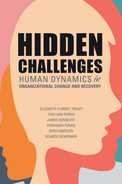When conditions are stable in organizations, the saying goes: “statistics are enough.” However, a purely rational-structural way of looking at organizations has never been a sufficient framework for understanding change in organizations. When everything goes crazy, we need all the data—including what might be less visible. People in organizations often refer to metaphors such as “elephants in the room” or “taboos” or “unspoken truths.” How can we access the less visible data that these metaphors hint at, and how do we work with it?
The unifying “red thread” of this book is the study of the multiple realities and intersecting social systems that make up organizations. In this book, we do not try to fix organizational challenges. Instead, we seek to shed light on circumstances which otherwise might appear undecipherable or even insurmountable.
Although as a reader, you may choose to dip in and out of the book; collectively, the chapters illustrate hidden dynamics that create energy or inertia in organizations in times of crisis and change. Each chapter author offers concluding thoughts that he or she has found useful in context, not as a solution, but as a pathway for further exploration and experimentation.
Our purpose with this book is to show that leaders and followers in organizations can uncover and frame the dynamics that influence crisis and change at individual, group, and organizational levels, in ways that are pragmatic and applicable. The chapter authors bring us much richer and deeper insights into the “why” behind thorny organizational dilemmas. They show us that if we explore the “why,” we may advance toward “how”: pragmatic and sustainable options for change.
A key contribution of this book is to show that businesspeople can indeed conduct research into the less visible aspects of organizational life and also put this approach into practice in organizations. All of the chapter authors are not only senior executives or organizational consultants but also graduates (with Distinction) of INSEAD’s Executive Master in Change (EMC) program. The chapters are drawn from their original MA thesis research. The contributors offer real gifts: insights and renewed energy to change the way we live in the world of work.
Keywords
systems-psychodynamic study of organizations; cumulative crisis management; organizational nostalgia and postalgia; working with narcissistic leaders; vilification of leaders; leader self-reflection; agency in organizational change and recovery
